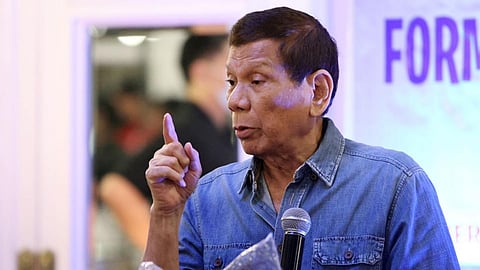
- NEWS
- the EDIT
- COMMENTARY
- BUSINESS
- LIFE
- SHOW
- ACTION
- GLOBAL GOALS
- SNAPS
- DYARYO TIRADA
- MORE

Former President Rodrigo Duterte was arrested by local authorities on Tuesday following an arrest warrant issued by a pre-trial chamber of the International Criminal Court (ICC) for crimes against humanity related to the killings of at least 33 individuals allegedly involved in illegal drugs during his tenure as both Davao City Mayor and President of the Philippines.
The arrest warrant was issued by the ICC on 7 March 2025, and signed by Pre-Trial Chamber Presiding Judge Julia Antoanella Motoc, along with Judges Sophie Alapini-Gansou and Maria del Socorro Flores Liera. In a 15-page order, the ICC chamber emphasized that Duterte’s arrest is necessary "to ensure his appearance before the Court."
The order explained that, despite Duterte no longer being in power, he “appears to continue to wield considerable power” and that his arrest was crucial to prevent interference with investigations and protect the security of witnesses and victims.
Although the Philippines withdrew from the Rome Statute on 17 March 2019, the ICC maintains jurisdiction over crimes committed while the Philippines was still a state party to the Statute. The arrest warrant covers crimes committed between 1 November 2011, and 16 March 2019, during which Duterte was in office.
The charges stem from the alleged killings of 19 individuals connected to the Davao Death Squad (DDS) during Duterte's time as mayor and the killing of 24 others during his presidency. However, the ICC found insufficient grounds to issue an arrest warrant for rape and torture charges.
The ICC chamber found that the elements of crimes against humanity of murder, as outlined in Article 7(1)(a) of the Statute, were met and that these crimes took place on Philippine soil within the relevant timeframe.
The chamber further noted that Duterte was the founder and head of the DDS and that he maintained "de facto control" over various agencies involved in his anti-crime policies, including the Philippine National Police (PNP) and the Philippine Drug Enforcement Agency (PDEA).
The chamber also highlighted Duterte’s role in orchestrating the killings, including establishing and overseeing the DDS, authorizing violence against suspected criminals, appointing key personnel to positions of power, and offering financial incentives and protection to those involved in the killings.
Taking all this into account, the ICC found reasonable grounds to believe that Duterte is individually responsible for crimes against humanity, specifically murder, as an indirect co-perpetrator during his presidency.
